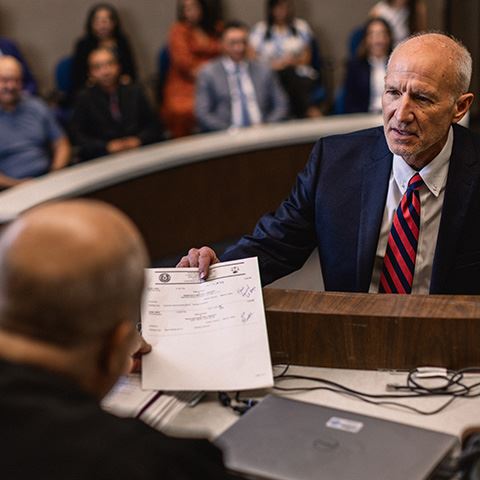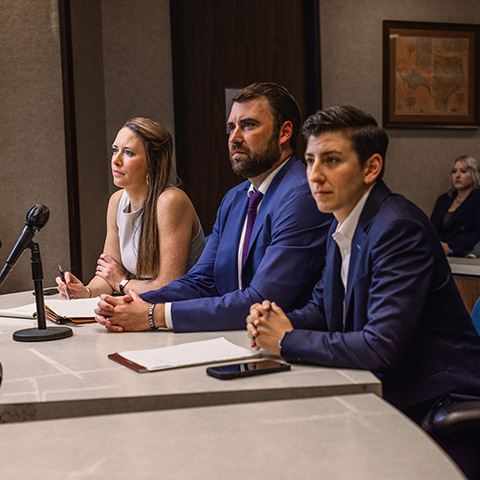Class Action Lawsuits in Texas
Over Three Decades of Legal Experience

There is strength in numbers. A group of people that have suffered the same or similar injuries can collectively file one lawsuit — this is known as a class action. Individuals who are discouraged from filing suit because of the low monetary value of their claim should consider a class action suit, which combines multiple small claims into one large sum. Class action lawsuits are often appropriate in antitrust, consumer fraud, personal injury, products liability, and other cases involving a large number of plaintiffs (those bringing suit.)
A few plaintiffs may file a claim on behalf of all members of the class and petition a judge for class status, which may be granted if:
- The number of class members makes it impractical for all to join in the suit
- The class members’ claims share common questions of law or fact
- The claims or defenses are typical of those for the rest of the class
- The proposed class representatives will adequately protect the interests of the entire class
- Common questions of law or fact predominate over questions affecting only individuals
- A class action would be superior to other methods of litigating the case
Common Types of Class Action Lawsuits
A class action lawsuit is designed to handle cases where individual claims might be too small to pursue on their own, but collectively, they represent a significant issue that needs to be addressed. Common types of class actions include:
- Consumer Protection: Cases where a company’s product or service causes widespread harm. Examples include defective products, false advertising, or breach of warranty.
- Employment Disputes: These involve issues like wage and hour violations, discrimination, or wrongful termination affecting many employees.
- Securities Fraud: Cases where investors are deceived or misled by false information related to investments, such as stock fraud or misleading financial statements.
- Environmental Issues: When a company’s actions result in widespread environmental damage or pollution affecting a large number of people or communities.
- Antitrust Violations: When companies engage in anti-competitive practices that harm consumers, such as price-fixing or monopolistic behavior.
- Data Privacy: Cases involving the unauthorized sharing or breach of personal data, often affecting a large group of individuals.
Class actions help streamline the legal process by consolidating similar individual claims into one representative action, making it more efficient for courts and more feasible for plaintiffs to seek justice.
The Legal Process of a Class Action Lawsuit
Here’s a brief overview of the class action lawsuit process in Texas:
- Filing the Complaint: A class action lawsuit begins when a plaintiff files a complaint in court, outlining the claims against the defendant. The plaintiff must show that their case is representative of a larger group with similar issues.
- Class Certification: The court must certify the case as a class action. This involves demonstrating that the class is so numerous that individual cases are impractical, that there are common questions of law or fact, and that the claims or defenses are typical of those of the class.
- Notice to Class Members: Once the class is certified, the court will require notice to be given to all potential class members. This notice informs them of the lawsuit, their rights, and how they can participate or opt-out.
- Discovery: Both parties engage in discovery, exchanging information and evidence related to the case. This process helps build the arguments for or against the class action and assesses the extent of the damages.
- Settlement or Trial: The parties may reach a settlement agreement, which must be approved by the court to ensure it is fair and adequate for the class. If no settlement is reached, the case proceeds to trial, where the court will decide on the merits of the claims.
- Post-Trial Motions and Appeals: After the trial, there may be post-trial motions for reconsideration or appeals. These can involve challenges to the verdict or the terms of the settlement.
- Distribution of Funds: If the class action is successful, any awarded damages or settlement funds are distributed to the class members. The distribution process can be complex and is overseen by the court to ensure fairness.
Contact Our Attorneys Today
At Hilliard Law, our experienced attorneys have been providing clients with dedicated and tenacious representation since 1985. We know how to fight for you.
If we take your case, we will work on a contingent fee basis, which means you don’t pay us unless we win.
Call us at (866) 927-3420 or fill out our contact form for a free consultation.



Real Results ReaL Justice
-
$50Class Action
Million Settlement*Mr. Hilliard was the lead class counsel in Haese v. H&R Block, a class action lawsuit involving every Texan who received a rapid refund from H&R Block (approx. 300,000 plaintiffs). He assisted other class counsel in forcing H&R Block to disclose it received kickbacks for arranging loans between its tax preparation clients and predatory lenders.
-
$20Property Damage
Million SettlementOn the eve of the arbitration hearing, Hilliard Law attorneys obtained a $20 Million settlement on behalf of Nueces County, Texas for property damage that occurred as a result of Hurricane Harvey.
-
$13.5Predatory Lending
Million VerdictIn 2005, Mr. Hilliard represented multiple plaintiffs in litigation with Ocwen Loan Services, LLC (formerly Ocwen Federal Savings Bank) on allegations of predatory lending. Mr. Hilliard tried two cases which resulted in combined verdicts of $13.5 million.



